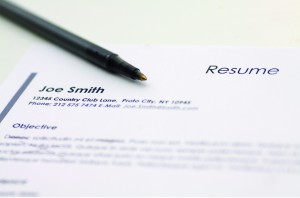Many a night’s sleep has been lost worrying about an upcoming job interview. Questions like “Will I make a good impression?” or “Am I qualified for the job?” can make for a restless night’s sleep on the eve before a job interview.
 Writing a resume is another aspect of the job hunt that can stoke your nerves. Men and women may pour over job timelines and skill summaries for hours in an effort to ensure they have included the right mix of information to get noticed.
Writing a resume is another aspect of the job hunt that can stoke your nerves. Men and women may pour over job timelines and skill summaries for hours in an effort to ensure they have included the right mix of information to get noticed.
Though resume writing has changed considerably over the years, some conventional wisdom about resumes still prevails, and how closely potential applicants adhere to these rules goes a long way toward determining if they earn a chance at an interview.
* Me, myself and I: While the resume should showcase your professional accomplishments, it also should showcase how your skills relate to the job you’re applying for. This way the company understands you have researched the position and are in tune with what they’re looking for in an applicant.
* One document for all responses: A resume is not a static document. It needs to change depending on the job you’re applying to. Although there will be certain information that can remain the same, update the skills and other information based on each position.
* One page is best: Applicants were long told to keep their resumes concise, limiting the document to just one page. However, if your experience is extensive or one page cannot contain a long job history, don’t be afraid to submit a two-page resume.
* Failing to be selective: You need not include your entire job history on a resume, especially if certain past positions you have held are completely irrelevant to the position for which you are applying. Don’t be afraid of job gaps, either. Many of today’s recruiters understand that the changing economy can make it challenging to maintain steady employment.
* Overembellishment: Do not embellish your skills. Always be open and honest on your resume. You may be asked to prove you can perform certain tasks, and if you cannot back up what is included on a resume, you will have wasted your time and the time the interviewer spent discussing his company’s opening with you.
* Imperfections: A resume is a reflection of you, so one with typographical errors or a poor layout is never acceptable. Ensure your resume is as professional and error-free as possible. Have a friend or a proofreader look it over before distributing.
* Paid positions: Internships or volunteer work are perfectly acceptable to include on a resume, particularly for younger applicants who may not have a wealth of professional experience. Include a mix of information on the resume that will reflect your versatility.
